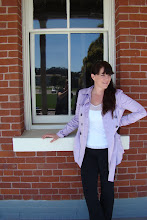I am delighted to round-off my celebration of three writer friends who have published novels this year with the third of the trifecta, Marie Manilla's The Patron Saint of Ugly.
I may be especially biased by the fact that her main character is named Ferrari, but I feel a deep kinship with Garnet, an outspoken yet intensely private woman who seems to witness a lot of unusual things. However, the similarities end with the fact that Garnet is being judged for a Catholic sainthood. Her story, told to Father Archibald Gormley via recording device, details her remarkable life and her skepticism about the miracles she supposedly performs. As hordes of followers descend on her home, begging for cures, Garnet's story unfolds, giving the reader what Booklist calls "a captivating reminder of the blurred lines between myth and reality."
Marie graduated from the Iowa Writers Workshop and her short stories have been published, well, in almost every prestigious literary journal this side of the Atlantic. For a sampler, try her brilliant and eclectic collection Still Life With Plums. You may also want to check out her first novel, Shrapnel, which won the Fred Bonnie Award for Best First Novel.
Here Marie answers my questions about the novel and its delicious blend of Southern gothic and magic realism.
This novel is such a fascinating blend of elements. How did
magical realism come together with Southern gothic and the Sicilian malocchio?
I’ve always been a fan of magical realism, particularly the
works of Garcia Marquez, Isabel Allende, and Salman Rushdie. I was fascinated
by the way they created worlds grounded in reality, but where magical
occurrences were presented in such a way that I believed them entirely. This
may harken back to my love of folklore, Aesop’s fables, and Grimms’ fairytales
that terrified and delighted me as a child.
When I created the fictional Sweetwater Village in Patron
Saint, I drew maps and named streets and created a robber baron who developed
the area. Then I added this girl covered in port-wine birthmarks who may be
able to perform miracles. Hopefully I’ve painted the world so thoroughly that
readers will be able to accept that it’s a typical immigrant village that just
happens to contain magical elements.
I’ve also always been a fan of Southern gothic, especially
the works of Flannery O’Connor, Eudora Welty, and Carson McCullers. Their prose
chronicled a defeated South peopled with rich, colorful, horrible, hilarious,
unconventional characters. Much of their work is infused with humor, even in
the face of evil.
There are a number of colorful characters in Patron Saint,
some quirky, some horrible, not the least of which is Garnet, whose birthmarks
are an evolving map of the world. She’s also an irreverent smartass whose voice
adds humor, even in the face of tremendous family tragedies.
At times, in both magical realism and Southern gothic, there
is the question of malleable truth. Readers get different versions of events
depending on who is doing the (tall) telling. Because Patron Saint is delivered
as tapes Garnet makes for a Vatican emissary, it’s possible that some of her
stories are hyperbolic or outright fiction. This question of truth is
heightened when Garnet’s grandmother, Nonna Diamante, steals the tape recorder
to set the record straight, as does Garnet’s aunt Betty.
The malocchio slipped in quite naturally, since Sicilian
Nonna Diamante not only believes in the evil eye, but she’s trained in the art
of warding off the jealousy of jettature. I had such fun infusing the novel
with details from Nonna’s hybrid blend of Old Religion and Catholicism.
This book is about Garnet, a would-be saint and reluctant
miracle worker who is totally fierce and funny. Can you talk about how you
developed her character? Where did she come from? Does she have a real-life
double?
I was born with port-wine birthmarks on my left hand that I
always thought looked like North and South America, including the Panama Canal.
When I was young, kids would screw up their faces and ask: “What’s wrong with
your hand?” My answers matured with my age: heat rash, rabies, syphilis. That’s
where the seed of the novel sprang from.
I’ve carried Garnet’s voice inside me for years. She’s the
smartass I would be if I didn’t have an internal firewall to keep me in check
(mostly). She’s also braver than I am. If you stripped away the magical
elements of the novel, Garnet is just a girl trying to negotiate a
dysfunctional family. All she wants is to be loved by her father, who is so
put-off by her port-wine stains that he just can’t give her the love she needs.
I think this speaks to many children, male or female, raised by parents of the
Greatest Generation, especially the fathers, who were taught to keep their
emotions in check. Public displays of affection were a no-no. Even I love yous
were rare.
Garnet is also every homely child who has been overlooked or
overshadowed. Though Garnet ultimately comes to embraces her “stained” self,
what’s more difficult is accepting her “sainted” self—and I think we’re all
both sainted and stained. Part of Garnet’s journey—and all of our journeys—is
learning to accept that duality.
Garnet does witness miracles, but like a lot of people she
isn't sure how to fit the strange and the unexplained into a rational view of
the world. In writing this book, did anything strange happen to you?
Initially, Patron Saint was simply about a girl born with
port-wine birthmarks, but they weren’t geographic, nor was Garnet a miracle
worker. She was just a child ostracized by some and adored by others who were
trying to protect her. I got about halfway in and realized the novel was flat,
but I didn’t know how to fix it. I posed the question to my subconscious: How
can I give the novel that added oomph? Not long after, I was walking in the
park and came upon a recently dead squirrel. There were no marks on its body.
It most assuredly was not breathing. I bent down to take a closer look, and
suddenly the thing sat up, shook itself off, and scampered away. I looked
around to see if anyone else had witnessed this miracle. (Okay. It was probably
stunned from a fall). Immediately, a question popped into my mind: What if
Garnet could perform miracles? That’s all it took to set the book on a course
that would include Nonna Diamante, the evil eye, the sixteenth-century St.
Garnet lore, the evolving birthmarks, the miracle-seeking pilgrims, the
Vatican, 60 Minutes.
Shortly after I made the decision to infuse the novel with
miracles, evil-eye lore, and the myth of the Pining Nereid, I started finding
relevant talismans on my daily walks: blue-eyed marbles, seashell buttons, holy
medals—confirmation that I was on the right path. I collected those and other
Patron Saint totems with the hopes that they would bless the endeavor and get
the novel into the right hands. Here’s a photo of the collection on the windowsill
in my office. Given that Patron Saint found such a wonderful home with Houghton
Mifflin Harcourt, I’m inclined to say the charms worked!
The novel is dedicated to your own Sicilian grandmother, and
you say she has haunted you for your entire life. Can you talk about her?
Like Garnet, I’m half Italian, and though one of her
staunchest allies is her nonna, my Sicilian grandmother, Concetta Ferrara
LaPelle Manilla, died sixteen months before I was born. Still,
I have always felt a connection to her. Even as a kid I loved working with my
hands: planting vegetables, embroidering pillowcases, making mud pies. More
than once my mother, Concetta’s daughter-in-law, said: “You’re just like
Grandma Manilla. She always had some project in her hands.” I’ve also always
been an experimental cook, tossing in spices and random ingredients. Again Mom
said: “You’re just like Grandma Manilla. Grandpa always said she could even
make shit taste delicious.” These comments made my kid-self wonder if I was her
reincarnation.
My paternal family was tight-lipped about their ancestry,
particularly about Grandma, who was always a mysterious figure. This red-haired
spitfire became a hero to me when I learned that she supposedly escaped an
arranged marriage in Sicily by selling some of the family jewels and hopping a
ship to America. I adored her bravery, even if it contradicted other family
lore, which was that she silently suffered Grandpa Manilla’s bullying. There
are various versions about how many husbands she had, and how she wound up in
West Virginia. That’s why there are several accounts in Patron Saint of how
Nonna Diamante and Grandpa Ferrari came to be man and wife.
What's next for your writing?
My novel-in-progress, Blood Orchard, is also a blend of
magical realism and Southern gothic. In it I explore the luck of fate: how
one’s life and future, and the future of one’s heirs, can be determined by not
only what century one was born in, but what gender and race and particular
patch of dirt. I chronicle the rise and fall of the fictional boomtown of
Waller’s Ferry, Virginia. The novel calls racism, sexism, and classism into
question, since the town-founding Wallers swapped skins and genders and
birthrights to survive. Some men are women, some whites are black, and those
who should be rich have been stripped of their fortunes, and at times their
very lives.

Structurally, I’ve set an ambitious task for myself, in that
throughout the eight generations the novel spans, the cast remains virtually
the same. In addition to a succession of malevolent aunties, grifters named
Asa, fallen preachers, and idiot Jebs, the two central characters are a string
of Portias and Doo Flys. Their birthrights were robbed from them in the
nineteenth-century, swapping what would have been a cushy Waller lifestyle for
one of poverty, prostitution, and addiction. But all those Portias and Doo Flys
are drawn to the Waller home and name. They understand on a cellular level that
they were meant for something better.
The present-day of the novel, the “over story,” follows the
final, twenty-first century Portia whose mother saved her from the cycle of
drugs and whoring by putting her on a train where she is rescued by Cherry.
Throughout the years, Cherry receives mysterious packages on her doorstep, which
contain artifacts that will inform both her and the found child about the truth
of her heritage, and who the Wallers really were. The artifacts include a scalp
from the French and Indian War, a Civil-War peg leg, a Gilded-Age dragonfly
brooch, a 1920s lotus earring, and more. Cherry’s trance-like “interpretations”
of these artifacts are how the history of Wallers Ferry is delivered to
readers. When the found child is old enough, the artifacts will send her on a
journey back to Wallers Ferry (now West Virginia) to claim her birthright for
good.
Thank you so much, Marie, and congratulations on all your success! For more about the author, check out her website, or find her on Twitter or Amazon.



























































